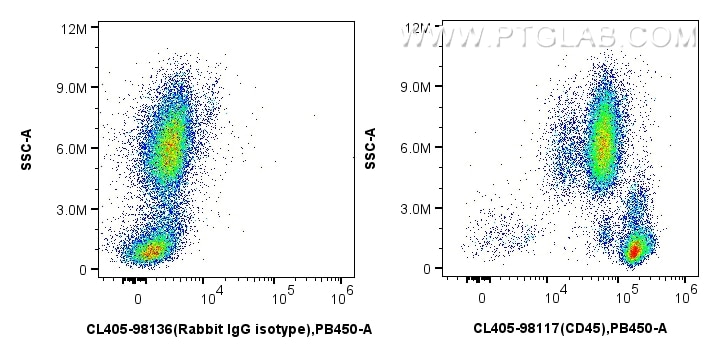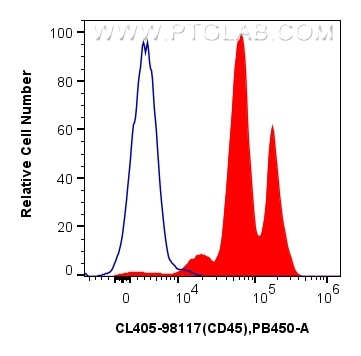Tested Applications
| Positive FC detected in | human peripheral blood leukocytes |
Recommended dilution
| Application | Dilution |
|---|---|
| Flow Cytometry (FC) | FC : 5 ul per 10^6 cells in 100 μl suspension |
| This reagent has been pre-titrated and tested for flow cytometric analysis. The suggested use of this reagent is 5 μl per 10^6 cells in a 100 µl suspension or 5 μl per 100 µl of whole blood. | |
| Sample-dependent, Check data in validation data gallery. | |
Product Information
CL405-98117 targets CD45 in FC applications and shows reactivity with human samples.
| Tested Reactivity | human |
| Host / Isotype | Rabbit / IgG |
| Class | Recombinant |
| Type | Antibody |
| Immunogen |
CatNo: Eg2486 Product name: recombinant human CD45(220-577) protein Source: mammalian cells-derived, pHZ-KIsec-C-6*HIS Tag: C-6*HIS Sequence: Predict reactive species |
| Full Name | protein tyrosine phosphatase, receptor type, C |
| Calculated Molecular Weight | 147 kDa |
| Gene Symbol | CD45 |
| Gene ID (NCBI) | 5788 |
| ENSEMBL Gene ID | ENSG00000081237 |
| RRID | AB_3672424 |
| Conjugate | CoraLite® Plus 405 Fluorescent Dye |
| Excitation/Emission Maxima Wavelengths | 399 nm / 422 nm |
| Form | Liquid |
| Purification Method | Protein A purification |
| UNIPROT ID | P08575 |
| Storage Buffer | PBS with 0.09% sodium azide, pH 7.3. |
| Storage Conditions | Store at 2-8°C. Avoid exposure to light. Stable for one year after shipment. |
Background Information
CD45, also known as protein tyrosine phosphatase, receptor type C, is a type I transmembrane protein expressed on the surface of all haematopoietic cells with the exception of erythrocytes and platelets (PMID: 3489673; 28615666). CD45 is a pan-haematopoietic cell marker and has been shown to be essential for T- and B-cell activation and signalling (PMID: 9429890; 16378097).
Protocols
| Product Specific Protocols | |
|---|---|
| FC protocol for CL Plus 405 CD45 antibody CL405-98117 | Download protocol |
| Standard Protocols | |
|---|---|
| Click here to view our Standard Protocols |






